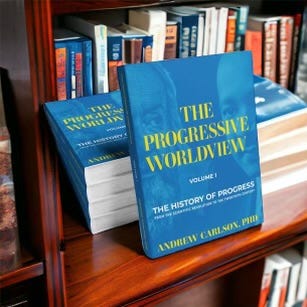Before reading Andrew Carlson's book “The Progressive Worldview: The History of Progress,” my understanding of what a progressive is was admittedly a bit shallow. I associated the term almost exclusively with political figures such as Bernie Sanders and Elizabeth Warren, viewing it through a narrow lens of contemporary political movements and debates.
This book, however, has profoundly expanded my understanding, revealing the depth and breadth of the progressive philosophy far beyond mere politics.
Carlson's work is a meticulous exploration into the essence of progressiveness, rooted in the belief that progress—social, scientific, and moral—is not only possible but essential for the betterment of humanity.
His narrative begins in the throes of the Scientific Revolution, tracing the evolution of progressive thought through the centuries. He argues compellingly that advancements in modern science have fundamentally reshaped our understanding of the world and, consequently, our approach to governing and organizing societies.
Reading this book was an enlightening experience for me, not least because it challenged me to reconsider my own preconceptions. I had always equated progressiveness with a specific political ideology, failing to grasp its broader implications for our collective worldview.
Carlson's dual focus on the scientific advancements and the moral philosophies that underpin the progressive movement illuminated the multifaceted nature of progressiveness. It's not merely about advocating for policy changes or aligning with a particular political party; it's a comprehensive approach to understanding our world and our place within it.
This first volume of The Progressive Worldview does not shy away from the complexities and nuances of its subject. By delving into the historical and philosophical underpinnings of progressiveness, Carlson provides a solid foundation for readers to grasp its significance.
It’s a narrative that weaves together the advancements in science with the moral imperatives that they entail, presenting a compelling argument for why a progressive worldview is necessary in our times.
When I asked Carlson for a clear and succinct definition of the term progressive, he had this to say:
“This may sound tautological, but in terms of my definition, being a progressive means you believe in progress. It means believing progress is possible, thus making it worthwhile to put in the hard work that progress requires.
And it means believing progress is actual—something that happens all the time, the way of the world—with the implication being that we are in harmony with the universe when we are making progress of our own, or even better, when we are helping the larger world take its next step or two forward.”
I then inquired about what pivotal moment or event he believed was the most influential in shaping the progressive movement as we understand it today? He offered this thought:
“The event that most immediately spurred the rise of the progressive worldview was the Scientific Revolution of the seventeenth century. When natural philosophers such as Bacon, Descartes, and Galileo struck upon a new method for studying nature that stopped looking to the established authorities for Truth and instead called upon investigators to utilize their own five senses and powers of reasoning, this unleashed a completely unprecedented burst of scientific learning.”
Carlson went on to note that while this rapid intellectual progress was inspiring in its own right, it also suggests that people could start using this new knowledge to reshape the world around them, making it a better place for its human inhabitants. This, he says, was born the promise of progress, and before long, the promise began to be fulfilled noting:
“In part, this progress came as engineers and inventors drew upon the emerging scientific learning to devise new technologies that began improving the material quality of human life in dramatic ways. And in part, progress came as Enlightenment philosophers began rethinking how we ought organize and govern ourselves, with the work of such political theorists as Hobbes, Locke, and Rousseau eventually leading many societies to abandon the steeply hierarchical systems that had long been the norm and move in the direction of more egalitarian forms of governance, ultimately to include representative democracy.”
Carlson adds that during the course of their work, these philosophers crafted a novel moral ideal, that of universalism, which proclaims that all people are of fundamentally equal moral worth and they ought to be treated that way. Carlson believes that while this idea has not yet been fully realized, it continues to serve as the moral North Star that guided progressives today in both their personal moral decisions and their political activism.
One of the most valuable insights I gained from this book is the recognition that progressiveness is fundamentally about embracing change—guided by the pursuit of knowledge and a commitment to ethical principles. This idea resonated with me deeply, as it reflected my own experiences of grappling with uncertainty and striving for a better understanding of the world.
Carlson's work has encouraged me to adopt a more inquisitive, critical thinking approach to this term, acknowledging that progress is an ongoing process that requires us to continually question, learn, and adapt.
It should be noted that The Progressive Worldview also acknowledges the challenges and misconceptions that accompany the term "progressiveness." In an era marked by polarization and skepticism towards differing viewpoints, the concept of progressiveness is often misunderstood or outright rejected by those who view it through a lens of bias or ideological rigidity.
Carlson's book serves as a critical reminder of the importance of engaging with complex ideas thoughtfully and without prejudice. It challenges readers to look beyond the superficial associations of progressiveness with specific political agendas, urging them to consider the broader implications of adopting a progressive worldview.
In conclusion, Andrew Carlson's “The Progressive Worldview: The History of Progress” is a profound and enlightening work that has significantly expanded my understanding of what it means to be progressive. It has taught me that progressiveness is not confined to the realm of politics but is a comprehensive philosophy that encompasses our approach to science, morality, and the organization of society.
This book has not only deepened my appreciation for the progressive tradition but has also inspired me to adopt a more thoughtful and open-minded approach to the challenges of our time. In a world fraught with division and uncertainty, Carlson's work offers a hopeful and compelling case for the value of progressiveness as a guiding principle for the future.
Your Invitation
Thank you for joining me here at “Great Books, Great Minds," where your passion for books takes center stage. This endeavor is more than a project; it's a labor of love that's driven by countless hours of research and writing. It's my way of contributing to a world filled with community, connection, and meaningful conversations, all nurtured by the power of literature.
If you've found this digital newsletter to be a source of inspiration and insight, if you relish the opportunity to explore exceptional books alongside remarkable authors and fellow book enthusiasts, then I'd like to extend a special invitation to you.
Join our community as a valued supporting member with a subscription at just $6.00 per month or $60.00 per year. By supporting the world of independent writing you are helping us in our ongoing quest to create compelling experiences between you and the authors that we regularly feature.







Thank you so much, Diamond, for your kind words, and for shining a spotlight on The Progressive Worldview. As you emphasize in your review, I believe being a progressive involves far more than just voting for certain candidates or taking particular political stances. It comes down to how you see the see the world--to believing the world can and does get better over time, thus implying we should do everything in our power to help make this happen. I'd invite everyone to come check out The Progressive Worldview Blog or find The Progressive Worldview, Volume I: The History of Progress available for purchase at www.theprogressiveworldview.com. Thank you again, Diamond!
Thank you, Michael, for this very interesting and important article. I suppose there is a difference between “progressive” and “Progressive”. Interestingly, a few years ago I read an article, I think in The Atlantic, about the difference between a Liberal and a Progressive. The main difference, according to the article, is that the Liberal is willing to compromise and the Progressive is not. Obviously this is a generalization but I think it is a sensible distinction.